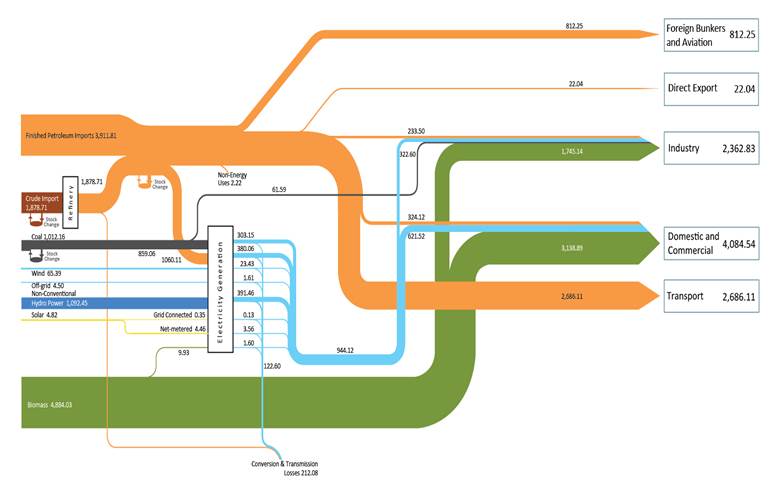ENERGY THE ESSENTIAL INGREDIENT OF MODERN DAY LIFE AN INTRODUCTION TO THE PUBLICATION OF ENERGY RESOURCES OF SRI LANKA [Part 3]
By Eng: Parakrama JayasingheThe debate and the need for on sustainability of all human activities has been going on for several decades now. This is driven by the limitation of the earthly resources and the inexorable and escalating demand for such resources. This is further compounded by both the increasing population and the growth of consumption due to the improving effluence of the world population. Thus the belief that one world is inadequate to meet such increasing demand has led to the need to find innovative means of meeting the aspirations of the world population with the available resources. The World Commission on Environment and Development which was established by UN in 1983 elaborated the concept of Sustainable Development defining it as "Development that meets the needs of the present without compromising the ability of future generations to meet their own needs”. In simple language, the message is do not exhaust all the resources now; leave something for the future too. This vision has now culminated in adoption of Sustainable Development Goals by the United nations in 2015 to which Sri Lanka is a willing and early signatory.
In the present day technological world, even for us in Sri Lanka with a very low level of per capita energy consumption, energy plays a vital role and is a resource much in demand across all levels of the society. So much so that we may include energy as the fifth essential component for human existence along with
Food, Shelter, Clothing and Medicine.
As such in this scenario the energy sector is at the focus of much discussion, mainly due to the recognition that the traditional forms of energy, based on fossil fuels is undoubtedly a limited resource. In addition the world has realized the multitude of negative impacts due to the excessive use of fossil fuels, particularly climate change.
Such negative impacts and the resultant knock on effects on many other aspects of human existence such as health, food security, loss of habitations and many more, has created many challenges. The developing countries including Sri Lanka in particular, aspiring to raise the standard of living of their people, towards the levels achieved by the developed world achieved by cheap fossil fuels in the past, are also faced with the issues of affordability and security of future supplies, if they too are to depend on this diminishing resource.
The Way Ahead for Sri Lanka
Under these circumstances Sri Lanka is well advised to device its own strategies and agenda to achieve the desired goals of Long Term Sustainability and Security of Energy Supplies. In this context, recognizing the fact that Sri Lanka has no proven fossil fuel resources, the attention to maximize the development of its indigenous sources of energy takes the highest priority. It is also necessary to recognize some important issues which appears to be not receiving adequate attention both in the public discourse or the information reaching the public from the relevant authorities. Thus attention needs to be paid on the issues of
.
- Energy is not limited to electricity.
In fact electricity occupies only a minor fraction of the national energy basket. It is less than 10%. The policy must formulate goals and targets and strategies to address all forms of energy viz.
- Electricity for domestic, commercial, industrial use.
- Thermal energy for industrial use.
- Thermal energy for domestic and commercial use.
- Transport fuel.
The energy balance below illustrates the relative importance.
Fig I – Sri Lanka Energy Balance 2015

Source : Sri Lanka Sustainable Energy Authority
- A long Term Perspective
Energy usage patterns and development of sources of energy does not happen overnight. Any short term measure done in haste, is bound to lead to undue disruption of economic and social life. A decision to adopt a change to the several aspects of energy policy, such as sources of energy, generation, usage and pricing, must take into consideration the possible long term impacts which may by and large be irreversible.
- National Energy Security
This is an aspect which receives little attention in Sri Lanka, due to an inability to recognize the importance of retaining control over the sources of energy in the country. The daily life of all citizens is technology driven, even those with humble lifestyles. Here energy plays an inescapable role.
The fair access and sustainability to supplies of energy, is therefore is almost a fundamental right of all citizens. At the national level it should occupy the central place in any national energy policy.
- Issues of Environment and Health
All energy generation has environmental and health impacts. Any new energy policy must examine this aspect carefully. The current policy has no mention of these aspects at all. It must also be mentioned that some energy technologies actually have positive environmental impacts and that should given due credit.
- The Basic Energy Needs of all Stake Holders
Access to basic energy needs is the right of all citizens and providing it is the responsibility of the state. Among the basket of needs, cooking energy takes a predominant position as shown in the Energy Balance Chart shown above.
- Available Sources of Energy
The most important ingredient of a National Energy Policy is the review of the available sources of energy, not for the next year or even the next ten years, but for a much longer time span, due to the long time lag and the difficulties of reversing any trends.
In this regard the first priority has to be on the identification of viable indigenous resources by careful review of emerging technologies in the world and by exercise of foresight. An examination of Sri Lanka’s ample resources of indigenous energy potential, which have the double advantage of being renewable and carbon neutral.
- Linkages to Other Segments of the Economy and Livelihoods
The development of the local energy resources can be an important factor in the economic development of the country. Dependence on imported energy for most of our energy needs and the predominant place they get in policy decisions is the cause for overlooking this important factor.
- The Cost of Energy Resources and Foreign Exchange Requirements
Sri Lanka depends on imports for many basic needs and in recent times the import of fossil fuels has escalated to danger levels. This foreign exchange expenditure has surpassed our earnings from the primary agricultural products Tea, Rubber and Coconuts. This trend has to be arrested without further delay.
Role of the Engineers in the Energy Sector
It is an undeniable fact that engineers have a most important role to play in all aspects of Generation, Resource Development , Energy Conversion, Distribution, Ultimate Usage, just to name a few. As such adequate knowledge and appreciation of these aspects of energy in all its forms is an essential requirement for all practicing engineers , be they directly involved in the different sectors of the energy industry or even as consumers. Therefore, the Mechanical Engineering Sectional Committee of the Institution of Engineers after much discussion and research found that this level of knowledge and understanding was not at a desirable level, in case of many present day engineers. As a means of rectifying this situation it was decided to launch a series of lectures open to the members of the Institution as well as the public, by eminent persons best equipped to disseminate this knowledge.
Coverage in the lecture series
The topics to be addressed as well as the lecturers were carefully selected to ensure the veracity and the accuracy of the information and data delivered as well as adequate coverage of the diverse aspects of the energy scene described earlier. The important issues of Long Term Sustainability and Security of Energy Supplies as well as the impacts on Environment were also covered. All lectures were live streamed and video filmed and later uploaded to the You Tube for viewing at convenience by all interested parties. As an additional means of ensuring that this valuable set of lectures are preserved to reach a much wider audience including engineers of all fields of engineering , students, and the general public, the lectures have been transcribed and presented in print form. The video records are also presented in the form of a CD.
Some information of the affiliations and the qualification and expertise of the lecturers have been added at the begining of the publication.
While an attempt has been made to cover as much of the important issues in the energy field, this is by no means comprehensive treatment of the subject. In this regard particular mention must be made of the presentation by Dr Thusitha Sugathapala on “The Energy Resources of Sri Lanka – The Traditional and Potential of New Sources”. This most comprehensive presentation is a most valuable contribution which would serve as a reference on the subject for many years to come. In order to facilitate the access of the many different topics covered in this presentation a sub sector contents page too has been included .
The perusal of this comprehensive presentation clearly underlines the immense bunty that mother nature has bestowed on us in Sri Lanka by way of renewable energy sources awaiting development. However, the majority of these sources are non firm and intermittent posing technical challenges for their utilization.
Therefore, it was considered appropriate to draw the attention of the reader to the current technologies and practices being used in the rest of the world to overcome such challenges, which we too need to understand and practice in the near furure. Therefore the official transcript of the Webinar Conducted by the Natural Renewable Energy Laboratory of USA on 16th October 2016 titled “Big, Fast and Flexible: Grid Operations for Efficient Variable Renewable Integration” with the kind permission of the NREL. The URL link to view this webinar is http://greeningthegrid.org/trainings-1/webinars/copy_of_facilitating-the-integration-of-renewable-energy-through-balancing-area-cooperation . The NREL authorities encourage the viewing of other materials on the same subject , available in thepublic domain for further information.
It must also be emphasized that these are only the written version of the presentations and not formal scientific publications. However, it would be seen that the wealth of information included, with the graphical illustrations and and tabulations are a source invaluable information on many aspects of the vast sphere of energy . It is expected that adequate information and data have been presented to provide an insight to the energy scene and to create adequate awareness amongst engineers as well as other segments of the society, none of whom can be considered outside the reach and influence of the ubiquitous role that energy plays in our daily lives.
 Eng: Parakrama Jayasinghe
Eng: Parakrama Jayasinghe
B SC, MI Mech E. FIE ( SL) P E Intl.
Co-ordinator and Compiler
